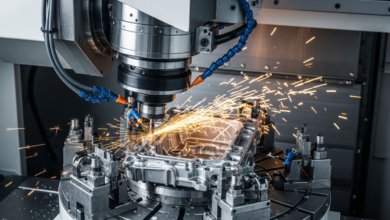The Economic Impact of Precision Casting Solutions

Precision casting, an engineering feat that has been honed over millennia, remains a cornerstone of modern manufacturing and an essential contributor to national economies. Through the production of highly accurate and complex components, industries across the world leverage this advanced manufacturing process. There is a reason for the widespread reliance on FC Casting Solutions and similar services, as precision casting drives innovation, creates employment, and contributes significantly to the GDP of many countries.
Boosting Industrial Capabilities
The advent of precision casting has introduced unmatched detail and accuracy in the production of metal components. Industries ranging from aerospace to automotive, and medical to defence, rely on these metal casting services to create parts that can meet their stringent requirements. This technological advancement not only enhances product quality but also extends the boundaries of what manufacturers are able to achieve, spurring further economic growth.
Investment in Technology and Skilled Labour
As an industry that requires significant expertise and advanced machinery, precision casting promotes investments in both technology and workforce development. Nations that excel in this area tend to have higher levels of technical education and training programmes, leading to a skilled workforce adept at navigating complex manufacturing processes. There is also a direct correlation between investment in precision casting and an upsurge in related research and development activities, further bolstering the economy.
Trade and Exports
Regions that specialise in precision casting often gain a competitive edge in international trade. Providing high-quality, custom-made components, countries with developed casting solutions are well positioned to export to global markets. This not only generates substantial revenue for the national economy but also cements their reputation as leaders in manufacturing excellence.
Job Creation and Skill Diversification
Precision casting is a labour-intensive process that necessitates a blend of manual dexterity and technical know-how. Not only does this generate a wide array of employment opportunities, but it also encourages diversity in skill sets. From engineers and designers to foundry workers and quality inspectors, precision casting supports a multi-tiered job market. This sector’s contribution to reducing unemployment rates can therefore be considerable.
Supply Chain Enhancements
The widespread demand for precision cast parts positively impacts supply chains. An efficient and responsive supply chain is vital for the health of a nation’s economy, fostering business continuity and resilience. The requirements for just-in-time manufacturing in sectors such as automotive have made precision casting an indispensable link in the supply chain, allowing economies to thrive even in volatile market conditions.
Impact on Ancillary Industries
Precision casting doesn’t only benefit those who produce the final components; numerous ancillary industries also rely on this process. For example, the creation of moulds and specialised furnaces required for precision casting means that industries supplying these materials and equipment flourish alongside the casting service providers. Therefore, precision casting has a multiplier effect on economic output, influencing diverse sectors.
See also: How Recruitment Automation Software Is Transforming Candidate Engagement
Environmental Standards and Sustainability
Modern precision casting techniques have evolved to meet stringent environmental regulations. This has prompted companies to innovate in ways that reduce waste and lower carbon emissions. Such a focus on sustainable practices not only benefits the environment but can also lead to cost savings for manufacturers. The implementation of green technologies can, in time, lead to economic benefits through energy efficiency and the appeal of eco-conscious products in the marketplace.
Integration with Digital Technologies
The integration of digital technologies, such as 3D printing and computer-aided design (CAD), has revolutionised precision casting. This integration expedites the design and production processes, allowing for the concept-to-production cycle to be significantly shortened. The economic implications are profound: increased output, reduced production costs, and improved competitiveness on an international scale.
Customisation and On-Demand Production
One of the salient features of precision casting is its ability to facilitate customisation. In a market where tailored products offer a competitive edge, the ability to produce bespoke components affordably and swiftly supports economic activities across various sectors, driving consumer satisfaction and brand loyalty.
Innovation and Market Expansion
As industries continue to evolve, precision casting enables companies to experiment with new materials and designs, opening up novel markets and application areas. This capacity for innovation makes significant contributions to economic resilience as new revenue streams emerge and mature industries are revitalised.
Conclusion
Precision casting has undeniably profound and multifaceted economic impacts. From the creation of high-value jobs to the enablement of global trade, the role of this manufacturing process in national economies is both pivotal and expansive. Countries that continue to innovate and invest in precision casting capabilities, such as those offered by FC Casting Solutions, will likely enjoy sustainable economic growth and competitive advantages on the world stage, all while nurturing a future-proof manufacturing sector.




